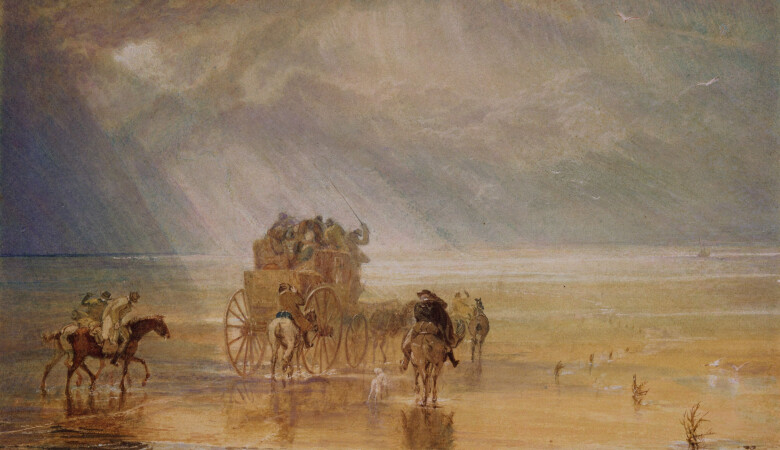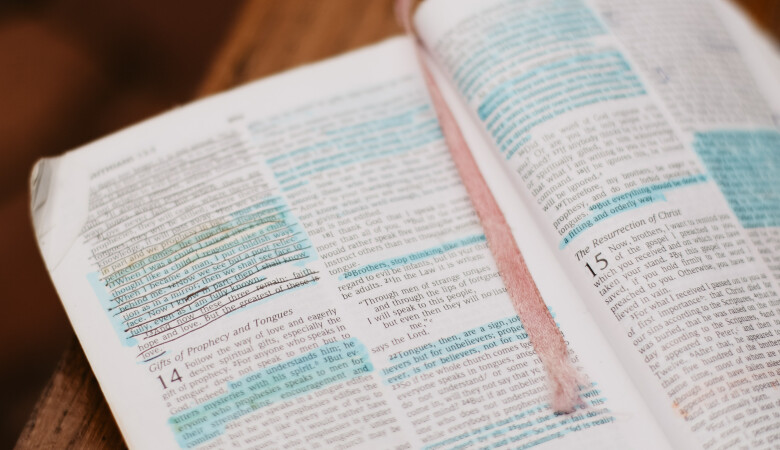A Masterpiece of Praise for God's Perfect Word
September 17, 2000 | Andy Davis
Psalms 119:1-176
sermon transcript
Introduction
As we've been studying in Psalms, we've been looking specifically at those Psalms which speak to us of the written Word of God and its impact on us, the transforming power of the Word of God, the perfection of it, and also even speaking of those Psalms that point to the Living Word, Jesus Christ. We've seen a blending together of those. The written Word testifies to the Living Word, and through the Word, we have life through Jesus Christ. As we come to Psalm 119, we come to a 176-verse Psalm. Many of you who have been here and heard me preach are wondering how in the world we're going to get through this Psalm today. We are not going verse by verse through this Psalm. This is about 40% longer than the verses we studied in Romans, so that should tell you about how long that might take if we did it that way. I'm not saying there wouldn't be value to it, there's a tremendous value to all of Scripture, and I have found an incredible value in Psalm 119, a value I didn't understand. But as I go on as a minister of Christ, and as I see where our culture and where our society is heading, I understand more and more the tremendous importance we should place on the written Word of God.
When did the modern world begin, the world we live in now? As you look around and see the technology and the essence, the blending of cultures, the mobility, this is the modern world, and we have a feeling that our age is unlike any other age that has ever been. When did it begin? According to David Wells and his marvelous book, No Place For Truth: Whatever Happened to Evangelical Theology?, he says some have argued that the modern world in the West and Western culture began to take shape sometime between 1815 and 1830. In 1815, Andrew Jackson defeated the British at New Orleans and the British defeated the French at Waterloo, and that began perhaps a period of increased influence and domination of English-speaking people through the British Empire, and a blending or kind of a melting together of international culture. Another thinker about these things, Geoffrey Barraclough argues for a later period, perhaps between 1890 and 1900 when the modern world began. At that time the scientific revolution began transforming all aspects of life through advances in medicine, technology, communication, tremendous changes in that decade, and it's laid the groundwork for the 20th century. David Bebbington has an interesting idea. He thinks that the modern world began, or it could be traced to an art exhibit in London. I'm not saying all these are right, I'm just saying they're interesting. At an art exhibit in London in 1910, the first time Post-Impressionist Modern Art was displayed publicly. You've seen the kind of paintings that I'm talking about, they make no sense, and it kind of symbolizes a 20th century which is kind of grappling with truth. But I think author Paul Johnson has his finger on something fascinating, and I think he may be right when he points to an obscure date, an obscure event as the beginning of a major aspect of our modern experience, and that is May 29th, 1919. What happened May 29th, 1919? May 29th, 1919, some photos were taken of a solar eclipse on an island off the coast of West Africa and in Sobral in Brazil. The two photos confirms the truth of a new theory concerning the universe that had been concocted 14 years before that by Albert Einstein, the special Theory of Relativity.
Before Einstein began thinking about the universe, everything seemed to make sense. Isaac Newton's universe was a universe of straight lines and right angles and forces, gravity and things that you could figure out, but they started to notice some aberrations in the way the planets moved, and Newton couldn't explain it. Along came Einstein to confuse us all. The problem with the photographs is that Einstein was right, the Theory of Relativity does accurately describe the motion of light and of great bodies through the space. When those photographs and the effects of that experiment were made public, Einstein became an immediate hero, a global hero. He was in demand as a speaker all over the world, his strange, wistful face, with that flyaway white hair, he became kind of a prophet for the modern age, an unwilling one, I can tell you that. He just wanted to be a scientist, but everyone kind of looked at him as the author of this idea of relativity. The principle of relativity is complex. Somebody summed it up saying in one simple statement, there is no such thing as absolute movement or motion. Well, I'm not a physicist, I'll have to take their word for it. I know that Isaac Newton had it kind of straight lines, right angles, everything could make sense, but now that there's no absolute motion, how do you explain things? All of a sudden, space becomes curved, light doesn't travel in a straight line anymore, things don't make sense. To the common man, everything is up in the air. You used to be able to understand, you pushed on something and it moved. Things move through space at a certain velocity until something else came and told it differently, and now we've got relativity. Because people couldn't understand it, it kind of meta-morphed into relativism; the belief that everything's up in the air, not just the idea of physics, but everything, there are no absolutes. No absolutes of time and space, but no absolutes either of good and evil, no absolute knowledge. You can't know anything in and of itself, and no absolute values. There's no absolute truth, and in this way, relativity became relativism. You all know what I'm talking about, because we see it around us all the time.
The irony of all of this is, according to Paul Johnson, it started with an eclipse, with a bending of a light ray around the edge of the sun. How appropriate? For now, most people in America seem to believe that there are no absolutes and no lights. No straight lights. No truth with a capital T. What was God's first creation? God said, "Let there be light." It was his way of communicating about Himself, but now it's curving, it's blocked like an eclipse, and nothing is absolute and all is relative. Is that true? If that's true, we have no salvation. It's for this reason that we as Christians more than ever before need to cling to the written Word of God. God established His Word to last forever and ever, truth unchanging, a foundation on which you can build your life, a foundation on which you can look ahead to an otherwise uncertain future with confidence and with hope.
The Purpose of Psalm 119: Exaltation of the Written Word of God
Psalm 119 is written to exalt and to praise the written Word of God and its impact on our hearts. Look down in your Scripture to 130. This is the point at which I would ordinarily read through the Scriptures, I'm not going to do that right now. What I'm intending to do today is to pull out some of these verses and paint a picture that Psalm 119 gives us of the written Word. Look at verse 130, it says in the New International Version, "The unfolding of your words gives light." The unfolding, or the Hebrew says, “the opening or the entrance.” The unfolding of your words gives light, it gives understanding to the simple. I have one purpose today, and it's the same purpose I've had since I've been here preaching, I want to unfold God's words to you, that's all I ever do. I want to unpack what is in here in the Scriptures. The unfolding of the Scripture gives light to the soul, and it doesn't bend and it doesn't arc, and it's not blocked, it comes directly right into your heart and it transforms you, it changes you. Psalm 119 is an extended praise for the written Word of God.
As you're looking down at verse 130, you notice some strange squiggles on the page. They're Hebrew letters. Go back to the very first verse, verse 1. I wish we were all Hebrew scholars. You would be looking at the Hebrew right in front of you. If you had it, you'd see the beauty and the poetry of Psalm 119, for what it is, is 22 Hebrew letters, and each letter gets its moment in the sun, each letter gets eight verses of opportunity to speak. It starts with the first one, “aleph.” You see that little... It looks like an X right under the word Psalm 119. That's the first Hebrew letter. The second Hebrew letter is the next one, “beth.” The Greek picked up on those names, we have alpha for aleph and beta for beth. You put those two together, you get a word that we say alphabet, that's where it comes from. This is a tribute to letters, the letters make up the Word of God, we read them that way. The first eight verses all begin with the same letter, aleph, and the second eight verses from verse 9-16, all begin with the same letter, beth, and so it goes through 22 letters. The Psalmist is giving a tribute to the written Word of God through the writing.
Where did the written Word of God originate? What was the start of it all? The start of it was a windswept Mount Sinai, and the first Scripture... I discovered this this morning. It says in Psalm 119:18, "Open my eyes that I may see wonderful things in your law." I pray that all the time, and so should you. When you come to Scripture, you say, "God open my eyes. I don't want to miss something here. I want to see things I haven't seen before." Well, today I saw something. I believe the first Scriptures, the 10 commandments, written with the finger of God on the tablets of stone, and given to Moses, God started it. This is amazing. The perfection of the Word of God. Do you know what the first letter in the Ten Commandments is? Aleph. It's in the word, the Hebrew word, which means I. What's the first saying in the Ten Commandments? "I am the Lord." God's first written Word to us is, "I am the Lord." Isn't that the essence of Scripture, who God is? God is so perfect this way, His first letter is the letter A, and He speaks to us, "I am. I am the Lord." As you're reading through Psalm 119 or any Scripture, you're getting God. The whole point is to create in you a hunger and a thirst for God Himself, and it's hidden in the letters.
The thing that's so beautiful about this whole approach is that whatever is inscribed in stone, we use that expression, well, it's not written in stone. Well, this was written in stone. What does it mean when we say things aren't written in stone? It means that they're changeable, right? They can be changed, but things that are written in stone, they can't be changed. Isn't that the nature of the Word? It cannot be changed. When God writes it down, it's there, it's perfect. He wrote in letters, and the letters were put together and they make words, and the words were put together and they make sentences and paragraphs and thought units, and He begins to communicate to us this way. So much so that He picks up on this in the Book of Revelation, where He says, "I am the Alpha and the Omega.” I am the start and the finish. There's a linear communication of information coming through these letters, and it makes sense, it comes into us, it gives light to us. Jesus said, "This is going to last forever." Matthew 5:18, "Until Heaven and earth pass away, not the smallest letter or the least stroke of a pen, jot and tittle," the little squiggles of Hebrew, "will by any means disappear from the law until everything is accomplished." And they haven't, they're still there. Dead Sea Scrolls proves it, 2,000 years of history. It's all still the same. God is protecting these letters.
Psalm 119 is an amazing tribute. Eight verses, eight verses, eight verses, letter after letter after letter. Eight more verses, eight more verses. Every single verse, except three, mention the written Word of God. The Psalmist uses 10 different Hebrew words for the written Word of God. He speaks of the law, he speaks of the testimony, he speaks of God's way, he speaks of precepts and statutes and decrees and commandments, judgments, ordinances, and the Word. My purpose today is to unfold for you the beauty and the perfection of Psalm 119, not for its own sake, but so that you may see the beauty and perfection of the God who inspired it.
What is God's overall goal in Psalm 119? He says it right at the beginning. Verses 1-3, explain God's purpose, not just for Psalm 119, but for all of the written Word. "Blessed are they whose ways are blameless, who walk according to the law of the Lord. Blessed are they who keep his statues and seek him with all their heart.” They do nothing wrong. They walk in his ways." That sums up what God is trying to accomplish here. He begins with the word “blessed.” The same word that began Psalm 1, "Blessed is the man who does not walk in the counsel of the wicked or stand in the way of sinners or sit in the seat of mockers, but his delight is in the law of the Lord, and on his law, he meditates day and night. He's like a tree planted by streams of water, which yields its fruit in season. Whatever he does prospers." Blessedness coming from the Word. It is here again, no accident, there's no accidents in the written Word. Blessings come to the study of the Word, blessing. God's overall goal, I believe, is a blessed or a happy content, right life of complete joyful obedience to Him. That's what He's accomplishing. The end is that we should seek Him with all of our heart. You see what He says in verse 2? "Who seek him with all their heart." It's that we're seeking the God behind these letters and words. The letters and words testify to us of a great God, a loving and majestic God who has sent His son to die for sinners. The Word speaks to us. We are to seek Him with all of our heart.
God’s Intention in Giving us Scripture
God's intention in giving us Scripture is laid out in Psalm 119, if you look at verse 4, it says, "You have laid down precepts that are to be fully obeyed." God demands and expects full obedience to His commands. In verse 152, it says, "Long ago, I learned from your statutes that you established them to last forever." God expects His commands to be fully obeyed, and He has established them for all human history. They're not worn out, they're not timeworn, they're not obsolete now that we're in the 21st century, but God established this law and this Word to last forever. Scripture needs no additions, no deletions, no corrections, no adjustments, no votes, no amendments, it is perfect and it is complete. Yet, as you read through, you see the word “law” again and again. We went through Romans, we know the law doesn't save.
Why is the psalmist rejoicing so much in the law? Why do we talk about the law? First of all, in many Scriptures, the word “law” stands for the written Word as a whole, not just for the Ten Commandments or for the rules and regulations, but just for the written Word. It is God's law, it comes from His mouth. But also understand salvation, salvation is more than just justification, it's more than just that you are declared not guilty and now you can go to heaven, and because you're secure in that, you can live anyway you want. No, salvation is bigger than that. It's a full-blooded salvation from sin, and when you are justified through faith in Christ, you come to faith in Christ, He then moves you and brings you back to the law, and says, "Do this. Love the Lord your God with all your heart, love your neighbor as yourself. Walk in my ways. There's a path through this world, and without me working in you, without my Holy Spirit, you can't walk it, but with me, you can." Look at verse 32. In verse 32, he says, "I run in the path of your commands, for you have set my heart free." That should be your life, if you're a Christian. “You have changed me from within, and now I run in the path of your commands. I don't go any which way that I choose, but I run along these tracks like a train runs along tracks. I run in the path of your commands for you have set my heart free.” Does that sound like the law is a burden to him? Is that the way the Psalmist feels? He says, "No, I delight in it." You get the picture almost of a child running down a country road on a summer day. I play, I run, I jump in the path of your commands. Why? For you have set my heart free. I'm a different man, I'm a different woman now, because you have set my heart free.
In the hands of some, the law was a terrible burden. Jesus talked about them, Scribes and the teachers of the law, those hypocrites. He says in Matthew 23:4, Jesus speaking of the teachers of the law and the Pharisees, "They tie up heavy loads and put them on men's shoulders, but they themselves won't lift a single finger to help." "But that's not the way I deal with the law," said Jesus. He said, "Come unto me all you who are weary and burdened, I'm going to take the burden off you and I'm going to put a new yoke, a whole new thing. Learn from me for I am gentle and humble in heart, and you'll find rest for your souls. For my yoke is easy and my burden is light." Brothers and sisters, the commands of God are no burden, sin is the burden. All the burdens, and the troubles, and the struggles you face in your life are because of sin. The law sets you free from all that, and so I do run in the path of your commands, for there is true freedom and joy.
John picked up on this in 1 John 5:3, when he said, "This is love for God, to obey his commands." You want to show that you love God? Obey His commands, and His commands are not burdensome. The Psalmist picks up on this. Begin at verse 14. Let's go through and we'll see his attitude toward the Word. Verse 14 says, "I rejoice in following your statutes as one rejoices in great riches." He really enjoys this. Verse 35: "Direct me in the path of your commands for there I find delight." Verse 45, "I will walk about in freedom, for I have sought out your precepts." Then just two verses below it in verse 47, "I delight in your commands because I love them." He loves the Word. Verse 54, "Your decrees are the theme of my song wherever I lodge. Everywhere I stay, anywhere I spend the night, I sing about God's Word." Verse 72, "The law from your mouth is more precious to me than thousands of pieces of silver and gold." Verse 97, "Oh, how I love your law, I meditate on it all day long." And then verse 103, "How sweet are your words to my taste. Sweeter than honey to my mouth." Is that your view of the Bible? Do you feel that way about Scripture or is it boring to you? One thing I've noticed about Scripture, the more you read it, the more you love it, the less you read it, the less you love it. I actually find that true of all spiritual disciplines, it's true of prayer as well, evangelism, all of them, the more you do it, the easier it is, the more you delight in it. The less you do it... It's just like being in shape. I'm trying to get back in shape. I rode my bike yesterday, I've got a long way to go. Long way. But the more I do it, the easier it'll get. So it is with the study of the Word. I'm not asking that any of you stand up and give a testimony as to the state of your heart right now, not that any of you would do it, but look inward and say, “What is my reaction or response to the Word of God? Do I enjoy it? Do I delight the way this Psalmist does? Is it like sweet honey in my mouth? Will I trade anything for the chance to sit down and read the Bible?”
If the answer to those questions is no, then may I suggest that you repent and come back to the Scripture? This is the Word of God, and the Psalmist, delights in it because he's receiving straight from God the words he needs to live. God has given us the power by the Word and by the Spirit through prayer for a heart transformation. I want to begin by showing you the delight of the Psalmist in the Word and asking you to compare your own experience and heart desires next to that. If you come up short, then I suggest you have work to do on your soul. You can't change yourself, that's the whole point, the Word of God alone can change you. God has given us two powerful tools for heart transformation, the Word of God and prayer, and both of them are in Psalm 119.
The first thing the Psalmist does in the Word is to describe it. He uses a number of adjectives: The word is good, it is ancient, it is righteous, it is trustworthy, it is eternal, it is unshakable, it is perfect, it is boundless, it is enlightening, it is wonderful, tested and true, it is right, and it is delightful. All of these are words the Psalmist uses to describe the precepts, the law, the testimony, the ways, etcetera. Picking out on one of them, he says, it's timeless. In verse 52, he says, "I remember your ancient laws, O LORD, and I find comfort in them." Or look at verse 89, 90 and 91. Verse 89 says, "Your word, O LORD, is eternal. It stands firm in the heavens. Your faithfulness continues through all generations, you established the Earth, and it endures." Verse 91, "Your laws endure to this day, for all things serve you." The timelessness of Scripture. What about the perfection of Scripture? Verse 96, it says, "To all perfection, I see a limit. But your commands are boundless." He's testifying that the Word of God is perfect, boundless and eternal. The Scripture is effective, it makes a change in us, it produces that joy to run along the path of God's commands. So I didn't used to be that way. I didn't used to cry when I read Scripture because of the power of the Word, that wasn't me, but it's made a change in me, and the more I study, and meditate, and memorize, it becomes like a forest fire inside me. I really yearn to study the Word. My son says, "I think, Daddy, you like to study the Bible more than anything else." I think it's true. I delight in the Scripture, and the more you study, the more you will as well. The Scriptures are delightful.
How does Scripture Change our Lives
The Scripture comes to us in three different categories to make a change in our lives. God's commands, God's promises, and God's warnings. The start is the commands; the promises and the warnings are on the backside of the commands. This is how it works, God gives you a command, you have a choice. You can either obey or disobey. With the obedience comes promises, blessing, delights, good things down the path of obedience. With the warning comes the opposite curses, trouble, discipline, struggle toward disobedience. That's how it works. Commands, promises and warnings. And he talks about all of them.
The commands of God give us a wise life. Verse 66, he says, "Teach me knowledge and good judgement, for I believe in your commands." Knowledge and good judgement comes from the commands of God. As we've already seen in verse 35, "Direct me in the path of your commands for there I find the light." God's commands changes us from within, gives us understanding, gives us insight, and produces delight. Then God gives us information about the future. “I know that you're either going to obey my commands or you're not going to obey. Let me tell you what your life will be like if you obey.” These are called promises. The Psalmist in Psalm 119 constantly rejoices in God's promises. Promises of salvation, for example, in verse 41, he says, "May your unfailing love come to me, O LORD, your salvation according to your promise." According to your promise. Promises also of God's grace, His love and His comfort. In verse 58, he says, "I have sought your face with all my heart, be gracious to me according to your promise." He is seeking God energetically. He's striving after God, he wants to know God more. He believes that God will respond, God will open up his face to him because He's promised to do so. The promises give him energy in his striving after God, because God always keeps His promises. But so also the warnings warn away from disobedience. Psalm 119 does not merely rejoice in blessings, but also fears God's curses on disobedience. Look at verse 118 through 120. It says, "You reject all who stray from your decrees, for their deceitfulness is in vain." In other words, if you live a life characterized by disobedience and wandering away from God's commands, God will reject you. “You reject all who live like that.” Verse 119, "All the wicked of the earth you discard like dross. Therefore, I love your statutes." Do you see that? The warning, he says, "I don't want to be discarded God, I love your Word. I love your Word.” That's how it works. Verse 120 is powerful. "My flesh trembles in fear of you, I stand in awe of your laws." You know what that reminds me of, Isaiah 66:2, "This is the one I esteem, he who is humble and contrite in spirit, and who trembles at my word." The Psalmist trembles at God's Word because it's coming right from the mouth of God.
What is the goal of the Word? We're going to talk more about this the next time we look at Psalm 119. The goal is understanding that God is working through your mind to change the way you think. He does it by bringing understanding into your eyes. As you open up the Word and as you pray to God and open your heart, you begin to understand some things you didn't know before. Some things start to make sense and start to click and connect. As a result, you start to choose to live a different life. God's goal in giving us the written Word is to change our understanding. This is a whole study that we're going to look at next time that we study this, but understanding is the goal. He says in verse 73, "Your hands made me and formed me, give me understanding to learn your commands." Also verse 130, "The unfolding of your words gives light, it gives understanding to the simple." God's goal is understanding. What comes from understanding? A fruitful life, obedience, deeper understanding, there's a cycle here. The more you understand, the more you want to study, the more you study, the more you meditate, the more you meditate, the more you understand. That's how it works, there's a cycle. Fruitfulness and holiness comes from all this. God's goal is understanding.
Psalm 119 is a Prayer
Now, the last aspect of Psalm 119 I want to look at with you is an amazing thing that I had also never noticed. Other than verse 1, verse 2 and verse 3, there is one other verse that is not addressed to God in prayer. Every other verse, 172 of them are addressed directly to God in prayer. Look at verse 9 through 11. These are perhaps the most famous verses also with verse 105. "How can a young man keep his way pure? By living according to your Word." He's talking to God. Do you notice that? That's called a prayer. When you're talking to God, you're praying. "By living according to your word. I seek you with all my heart. Do not let me stray from your commands. I have hidden your word in my heart that I might not sin against you." You see, it's very personal. When he's reading Scripture, it's not just him and a book, it's him and the God of the book, there's a conversation going on. God speaks to him through his Word, he speaks God's Word back to Him. It's prayer over God's Word that transforms our hearts. In verse 105, "Your word is a lamp to my feet and a light to my path." Whose Word? Your Word. God's Word. It is prayer over Scripture.
There are two key types of prayer, and we're going to look at this a little more next time. Number one, prayer to understand God's Word, and number two, prayer to obey. 16 times he prays each one. 16 times he prays to God that he might understand God's Word. Verse 12, "Praise be to you, O LORD. Teach me your decrees." The best of them all is verse 18, and I suggest every day that you begin your day with reading a Scripture, and you begin with Psalm 119:18, "Open my eyes, O LORD, that I may see wonderful things in your laws." He comes to God and says, "Give me understanding of your word, and if you do, I'll understand it." Secondly, the Psalmist prays for God to cause him to obey. In verse 5, he says, "Oh, that my ways were steadfast in obeying your commands." In Verse 10, he says, "I seek you with all my heart. Do not let me stray from your commands." Verse 29, he says, "Keep me from deceitful ways, be gracious to me through your law."
Verse 35, he says, "Direct me in the path of your commands, for there I find delight." Verse 36, he says, "Turn my heart toward your statutes and not towards selfish gain." Verse 37, "Turn my eyes away from worthless things, preserve my life according to your word." Verse 80, "May my heart be blameless toward your decrees that I may not be put to shame." Look at verse 133, "Direct my footsteps according to your Word, let no sin rule over me." He's saying, "I can't even walk unless you direct me."
This is how it works. You come to the Scripture, you pray to God and say, "Open it up for me, I don't understand unless you teach me. Holy Spirit, give light where there was none, or else it's just gonna be black marks on a page to me. It will not change me. Open my eyes that I may understand." Once I understand, I come back to God and I say, "God enable me, empower me to obey what I've learned." That's how it works. I can't even obey unless you work in me. Do you see how humbling this is? But it's a joyful humbling. It means that we're being transformed, we're coming to God for everything. Now, what have we seen so far today? Psalm 119 is an extended and complex poem, which exhausts the written Word of God. 22 letters each verse. Each letter gets eight verses of praise, eight chances to praise God for His written Word. Psalm 119 tells us of the perfect, the beautiful, the delightful nature of Scripture, and Psalm 119 is an extended prayer over Scripture. It teaches us the two basic tools, the two basic disciplines where your lives can change through the power of God, the written Word and prayer over the written Word, which produces understanding, which produces obedience. I'm going to finish up by telling you a simple thing, God does not want your obedience. He already has that, He's the King of kings and Lord of lords. Nobody can turn aside from His path or disobey Him. He rules over him, he rules over all nations already. God does not want your obedience, he wants your glad obedience, there's a difference. He wants you to delight in His commands, He wants you to be happy to do His will. That is the essence of salvation. We are saved from rebellion to come back and say, "On earth as it is in heaven, I want to do your will."
Closing in prayer, “Father, we've just begun to understand Psalm 119. It is deep, it is interconnected, it is rich, and it teaches us much about your Word. Heavenly Father, I pray for your people that they may understand your Word. The purpose of Scripture is clear that they might be made wise for salvation through faith in Christ Jesus. Father, if they're any here who do not know you as Lord and Savior, I pray that they would seek you with all their heart and they might find salvation through the blood of Christ. And for all of us, O Lord, who have already made a commitment to you, I pray that we would not neglect your Word, but rather study it with all diligence, we pray in Jesus name. Amen.





















